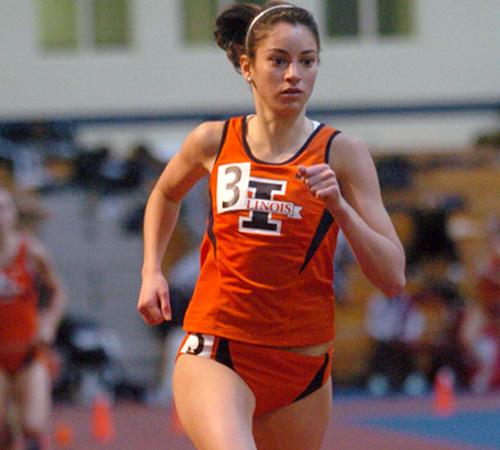Olympic trials loom for Illini

June 27, 2008
In the 2004 Athens Olympics, Illinois had five athletes, Yvonne Harrison, Dawn Riley, Perdita Felicien, Jenny Kallur and Susanna Kallur representing the University.
As the Beijing Olympics approach, the women’s track and field contingent will travel to Eugene, Ore., and Windsor, Ontario, in an attempt to add to the rising amount of Illini going to China for the 2008 Games.
The team and head coach Gary Winckler will have the coming weeks to qualify, with nine current or recently graduated Illini competing in the U.S. and Canadian Olympics trials, June 27-July 6 and July 3-6, respectively.
“We had some exceptional athletes in that year,” Winckler said about the 2004 Games.
This year’s crop will feature four current athletes from Canada: Katie Engel in the 1,500-meter run, Alecia Beckford-Stewart in the heptathlon, Nikkita Holder in the 100-meter hurdles, Cheria Morgan in the 100- and 200-meter sprints and former Illini Yvonne Mensah in the 400-meter hurdles.
Get The Daily Illini in your inbox!
Attempting to represent the United States will be current Illini Angela Bizzarri in the 5,000-meter run and Aja Evans in the shot put, while alumuna Gia Lewis will throw discus and LaNeisha Waller will run the 100-meter hurdles.
“They’re all very fortunate; the trials are obviously one of the hardest events to get into,” Winckler said, referring to the B-standard qualification required to compete in the Olympic Trials.
The athletes are working toward attaining A-standard status by earning one of the best three performances in any event for the country. A-standard athletes automatically earn one of three spots for Beijing. Some athletes have already garnered the status, lowering the number of ‘A’ slots available for the games. If an event still has ‘A’ slots to be filled, it will be done at the Olympic Trials.
“If a country doesn’t have any ‘A’ athletes, they can take the person who has the best qualifying mark from the trials, they are what’s considered a ‘B’ athlete, those that are trying to qualify,” Winckler said. “If that makes any sense to you.”
Out of the athletes competing, Winckler spoke of Mensah’s ability on the 400-meter hurdles with confidence. The now-retired coach noted she has “world-class speed” in the event, even though she was more involved in sprinting and field events in college.
“She came (to Illinois) as a hurdler,” he said, “She’s always been a great sprinter, but she really has liked hurdling.”
But regardless of speed, experience or any other factor, Winckler admitted he has tempered expectations for most, especially the American, collegiate athletes going into the trials.
“Even if you have been there before, it can be intimidating (going to trials,)” he said. “Tonja (Buford-Bailey)made it there as a junior in 1992, she was one of two collegiate athletes in the Games that year, I think. It’s pretty unusual to see a college athlete go.”
But regardless of whether they make the team, Winckler was glad to see the athletes get the experience to compete at one of the sport’s highest levels.






